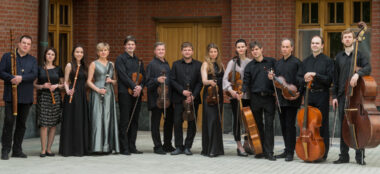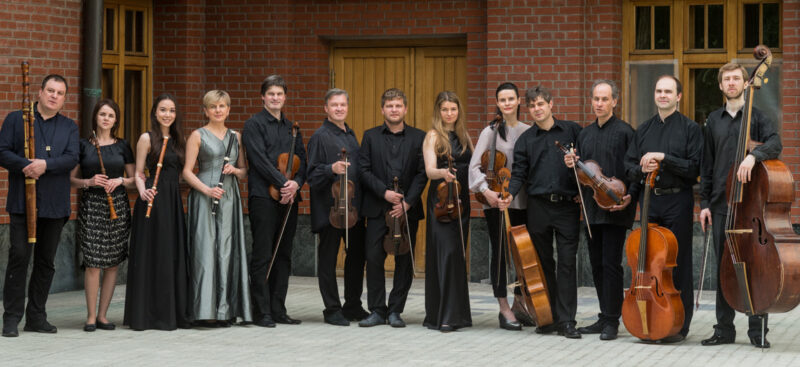 Russian Federation Bach, Telemann: Pratum Integrum (leader: Sergey Filchenko). Streamed by Digital Concert Hall from the Sverdlovsk Philharmonic Hall, Yekaterinburg, 9.3.2022. (GT)
Russian Federation Bach, Telemann: Pratum Integrum (leader: Sergey Filchenko). Streamed by Digital Concert Hall from the Sverdlovsk Philharmonic Hall, Yekaterinburg, 9.3.2022. (GT)

J S Bach – Orchestral Suite No.3 in D major, BWV 1068 (for strings); Harpsichord Suite No.3 in D major, BWV 1054
Telemann – Quartet (Concerto) for strings in D major TWV 43 D4; Ouverture–Suite in E minor TWV 55: e4; Concerto Grosso TWV 52: G1
The eleventh Bach Fest is midway through its series of concerts and events in March, and this eagerly anticipated concert proved a major highlight of the 2022 festival. The Moscow-based ensemble Pratum Integrum was founded in 2003 and since then has achieved a wide success for their historically informed performances. They have released fifteen recordings including works by neglected Ukrainian composers Berezovsky and Bortnyansky, and world premiere recordings of forgotten works by Telemann, Rosetti, Platti, Tietz, and Wölfl. In two decades of musical performance, Pratum Integrum have premiered more than two hundred baroque works in Russia, including collaborations with distinguished musicians such as Trevor Pinnock, Sigiswald and Wieland Kuijken, Philippe Jaroussky, Christophe Rousset, and others. Among their projects were the premieres of Georg Gebel’s Johannes Passion, Lully’s Les Saisons, and Fomin’s Orfeo ed Euridice (the latter with the Russian Horn Orchestra). The ensemble has given performances at major music festivals including Tage Alter Musik in Regensburg, Musica Antiqua in Bruges, the Magdeburg Telemann Festival and the St Petersburg Early Music Festival. The ensemble’s Artistic Director Pavel Serbin has led the research behind their concert repertoire, and their recordings on the Caro Mitis classical music label include six monographic albums devoted to Telemann, one of which received the Preis der Deutschen Schallplattenkritik in 2011.
It was clear from the opening bars of Bach’s Orchestral Suite No.3 – in the original variant for strings and harpsichord – of the extraordinary virtuosity of the twelve musicians (who all play instruments from the seventeenth and eighteenth century). In the Ouverture, the splendour and festive nature was palpable especially in the playing of the leader Sergey Filchenko – with an association with the music of Lully sounding pleasing to the ear and seeing the enthusiasm of the musicians in their moulding of the gripping dynamics. In the graceful Air, there was beautiful virtuosity in the quartet passage, and in the charming harmonies, notably enhanced by the switch of rustic festive dances through to the elegant Gigue and the poised, dynamic, effervescent finale.
The virtuosity in their brilliant faithfulness to historical performance continued in the Harpsichord Suite – which started out as a Violin Concerto in G major – self-confident in his material, the composer decided to switch the key to D major. The origins of a concerto were evident especially in the structure A-B-A with the excitingly striking dynamics of Filchenko and his players, in his opening with the brusque almost staccato chords, followed by a lively idea on the keyboard by Nikolay Martynov. The performance of the Adagio was particularly moving, and appealing in its boundless emptiness, while in the third movement, Passepied, we heard bracing melodies, bright and upbeat and very musical – evidence of the standards of the orchestra.
The second half of the programme was devoted to the music of George Philipp Telemann, a composer with whom this ensemble has been linked with several world premiere recordings including one of the pieces performed here in Yekaterinburg. In the first of three pieces by Bach’s contemporary it was clear of the individuality of Telemann’s voice compared to Bach. In the first movement of the Quartet, the beautiful flowing melody revealed Telemann’s replication of French elegance, elevated with colourful harmonies; while in the second movement, the tempo was bracingly fast with the harmonies flashing by; and the third, a gorgeous dance-like idea was linked to another rapturous one; and in the fourth movement, a brisk and joyful dance had a graceful momentum.
In the Ouverture from Telemann’s Suite, full title Hamburger Ebb’ und Fluth (Ebb and Flood), Filchenko introduced an extraordinary lofty melody against some darkness from the bass and cellos. The second idea on Filchenko’s violin was beautiful, graceful, and was followed by a rocking dance on the violins and violas, and a more graceful theme was introduced at a playful tempo, before transforming into an elegiac, and then stepping dance, before the elegiacally pleasant close.
In the Concerto Grosso – originally based on a Concerto for Two Violas – a piece premiered by Pratum Integrum; we heard some quite beautiful virtuosity distinguished by more mastery from the solo violin of Filchenko. This was quite stunning playing notably of an almost sighing idea which sounded quite heavenly, which was abruptly followed by a bright joyful mood, before closing quietly. In their encores, the ensemble played brief pieces by Vivaldi, Geminiani and repeated the Air from Bach’s Third Suite. This was a tremendous concert of historically informed music from the eighteenth-century and brought some temporary solace from the terrible events in Eastern Europe.
Gregor Tassie
